 Chapter 1
Chapter 1
|
 A Sketchy Record of a Family
A Sketchy Record of a Family
|
 The following was provided by cousin
Theodore R. Miller, son of Ella Speraw Miller, one of my father’s sisters. He was a Naval Architect,
lived in New York and spent time researching our family history. The following was provided by cousin
Theodore R. Miller, son of Ella Speraw Miller, one of my father’s sisters. He was a Naval Architect,
lived in New York and spent time researching our family history.
 I have a copy of his unique book,
"Miller’s Graphic History of the Americas." It shows the development of the continent by
maps that records the founding and growth of all the countries. I also have a copy of his map
showing the Civil War path of the 26th Illinois Infantry with William and John Lang and 92nd
with William Speraw and includes Sherman’s "March to the Sea." Ted added historic notes along
the route including where William Speraw and John Lang were wounded and where William Lang died
on August 28, 1862, at Iuka, Mississippi. I can provide photo copies of the map upon request. I have a copy of his unique book,
"Miller’s Graphic History of the Americas." It shows the development of the continent by
maps that records the founding and growth of all the countries. I also have a copy of his map
showing the Civil War path of the 26th Illinois Infantry with William and John Lang and 92nd
with William Speraw and includes Sherman’s "March to the Sea." Ted added historic notes along
the route including where William Speraw and John Lang were wounded and where William Lang died
on August 28, 1862, at Iuka, Mississippi. I can provide photo copies of the map upon request.
|
 William Speraw 1810-1875 and Magdalena Seigel Speraw 1813-1881.
William Speraw 1810-1875 and Magdalena Seigel Speraw 1813-1881.
|
 The Speraws, Seigels and Langs (records show Lang as "Long") arrived from Western Germany
during the early 1830's. William Speraw was born in the lower Rhine country of western
Germany in 1810, and his wife Magdalena Seigel may have been born in the same area about
1813. Physically he was not a large man but little is known of his character and personality.
Magdalena from all indications was a fine woman who had a good influence on all who knew her.
The Speraws, Seigels and Langs (records show Lang as "Long") arrived from Western Germany
during the early 1830's. William Speraw was born in the lower Rhine country of western
Germany in 1810, and his wife Magdalena Seigel may have been born in the same area about
1813. Physically he was not a large man but little is known of his character and personality.
Magdalena from all indications was a fine woman who had a good influence on all who knew her.
 One source states that Magdalena had to work three years to earn her passage across the Atlantic.
This could mean they may have come over separately by way of Holland and England around
1830–35, became acquainted in eastern Pennsylvania and were married there. They were members
of a small sect called "Dunkers," a belief strongly opposed by both the German Lutherans and
the Roman Catholics.
One source states that Magdalena had to work three years to earn her passage across the Atlantic.
This could mean they may have come over separately by way of Holland and England around
1830–35, became acquainted in eastern Pennsylvania and were married there. They were members
of a small sect called "Dunkers," a belief strongly opposed by both the German Lutherans and
the Roman Catholics.
 They established themselves on a farm in either, Franklin or Juniata County in Pennsylvania
where all of their five children were born, William Jr., Elizabeth, John, Kate and Mattie.
They established themselves on a farm in either, Franklin or Juniata County in Pennsylvania
where all of their five children were born, William Jr., Elizabeth, John, Kate and Mattie.
 They only spoke their native language, Low German, but as the children grew they acquired a
mixture of English and Low German commonly known as Pennsylvania-Dutch. The dialect persisted
into the next generations as they traveled west into Illinois and Iowa. About 1852 they
migrated to Illinois where they acquired a farm three miles southwest of Shannon near the
center of the State. The farm prospered but its not known how long William Jr., my Grand
Father, stayed with his parents.
They only spoke their native language, Low German, but as the children grew they acquired a
mixture of English and Low German commonly known as Pennsylvania-Dutch. The dialect persisted
into the next generations as they traveled west into Illinois and Iowa. About 1852 they
migrated to Illinois where they acquired a farm three miles southwest of Shannon near the
center of the State. The farm prospered but its not known how long William Jr., my Grand
Father, stayed with his parents.
Answering President Lincoln’s call for 300,000 more, William (2nd), at the age of 23
enlisted at Mt. Morris, Rockford, Illinois on August 11, 1862, Company K, 92 Regiment,
Illinois Volunteer Infantry. He served under General Sherman and was in the "March to
the Sea". He was mustered out June 21, 1865 at Concord, North Carolina. The army records
describe him as blue eyes, light hair and 6'½" tall and from Pennsylvania. He was
wounded at Chickamauga, September 20, 1863. Four Langs, or Longs, also served, Jacob,
Charles, William and John.
 After the war he returned home and helped his parents with their farm and met Margaret
Elizabeth Lang who was visiting her sister living on a bordering farm. They were married
in Shannon on December 12, 1868 and lived with his parents until his father’s death in 1875.
About 1876, with their three German speaking children, Charles, Ernest and Magdalena
(Mattie), migrated to Cass County in south west Iowa. They settled on a 160 acre farm two
miles east and one mile north of Cumberland.
After the war he returned home and helped his parents with their farm and met Margaret
Elizabeth Lang who was visiting her sister living on a bordering farm. They were married
in Shannon on December 12, 1868 and lived with his parents until his father’s death in 1875.
About 1876, with their three German speaking children, Charles, Ernest and Magdalena
(Mattie), migrated to Cass County in south west Iowa. They settled on a 160 acre farm two
miles east and one mile north of Cumberland.
 Magdalena lived with them for about four years. It is said that like most pioneer women
she was a very practical and efficient person, always occupied with and assisting in the
daily household tasks. She had a close relationship with her grandchildren and spent much
of her time in teaching them how to accomplish the many tasks so important in those early
days. She smoked a corn cob pipe and carved her own fashioning the stems from elderberry
branches.
Magdalena lived with them for about four years. It is said that like most pioneer women
she was a very practical and efficient person, always occupied with and assisting in the
daily household tasks. She had a close relationship with her grandchildren and spent much
of her time in teaching them how to accomplish the many tasks so important in those early
days. She smoked a corn cob pipe and carved her own fashioning the stems from elderberry
branches.
 She taught her Granddaughter Mattie how to piece a quilt when she was four years old which
she finished when she was six and became an expert seamstress. Her pet hen named "Biddie"
would jump up on her lap each day and lay an egg with all the usual fussing and cackling.
When Biddie wanted to set she prepared a nest for her in a box next to the stove.
She taught her Granddaughter Mattie how to piece a quilt when she was four years old which
she finished when she was six and became an expert seamstress. Her pet hen named "Biddie"
would jump up on her lap each day and lay an egg with all the usual fussing and cackling.
When Biddie wanted to set she prepared a nest for her in a box next to the stove.
 This ends Theodore’s information.
This ends Theodore’s information.
|
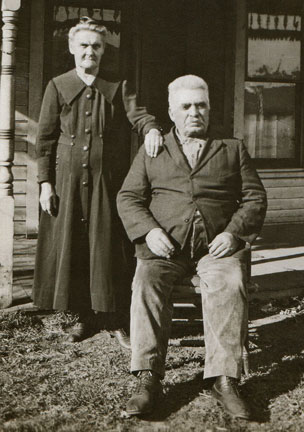
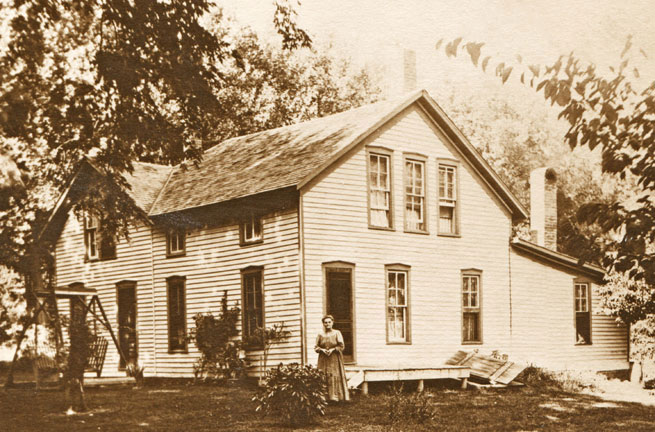
 Sometime after the Civil War Grand Father and Mother had a small hotel at the end of the railway spur
in Cumberland, Iowa where my father, Lester, the youngest of their eight children was born. The two
I met were Aunt Kate who lived on a farm in South Dakota and uncle Jess who lived in Iowa.
Sometime after the Civil War Grand Father and Mother had a small hotel at the end of the railway spur
in Cumberland, Iowa where my father, Lester, the youngest of their eight children was born. The two
I met were Aunt Kate who lived on a farm in South Dakota and uncle Jess who lived in Iowa.
 William and Elizabeth, and their home/hotel in Cumberland. Her obituary is on the previous page.
(Click the photos to see a larger versions.)
William and Elizabeth, and their home/hotel in Cumberland. Her obituary is on the previous page.
(Click the photos to see a larger versions.)
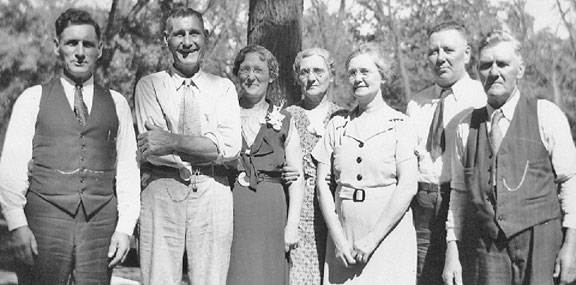
 Dad attended school through the 5th grade which was all that was offered and worked on the
farms and in a brick yard for 75 cents for a 10 hour day. At the time he met Mother he had
a dry cleaning shop with a small gym in the rear where he and his friends practiced wrestling,
boxing and gymnastics.
Dad attended school through the 5th grade which was all that was offered and worked on the
farms and in a brick yard for 75 cents for a 10 hour day. At the time he met Mother he had
a dry cleaning shop with a small gym in the rear where he and his friends practiced wrestling,
boxing and gymnastics.
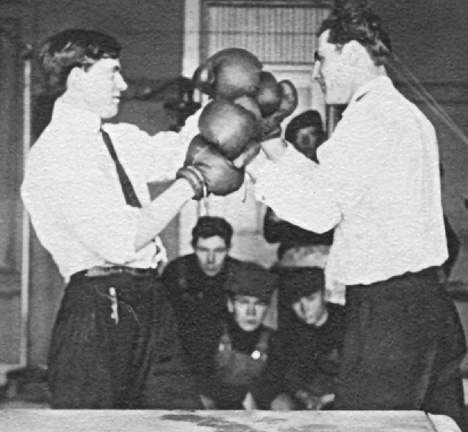
 Great Grandfather Joseph Henry Jones. Born in Illinois had a good sized farm near Monroe, Iowa
and died at the age of 86. Great Grandmother was Sarah Atlanta Dowler who died at the age of 89
in Santa Rosa, California. I remember being told that his only vice was horehound candy and that
as a youth he worked on farms for $10 a month and at the end of the year he would have $120 and
a new pair of bib overalls.
Great Grandfather Joseph Henry Jones. Born in Illinois had a good sized farm near Monroe, Iowa
and died at the age of 86. Great Grandmother was Sarah Atlanta Dowler who died at the age of 89
in Santa Rosa, California. I remember being told that his only vice was horehound candy and that
as a youth he worked on farms for $10 a month and at the end of the year he would have $120 and
a new pair of bib overalls.

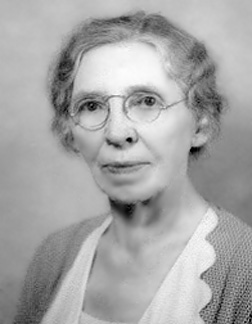 One of their children was my Grandmother, Olive Jones Wagner, approximately 1868 – 1943. When
the notice of her death came to me in Burma she was living with my Mom and Dad in Grass Valley,
California.
One of their children was my Grandmother, Olive Jones Wagner, approximately 1868 – 1943. When
the notice of her death came to me in Burma she was living with my Mom and Dad in Grass Valley,
California.
 In 1890 she married Francis Marian
Wagner. He was from Muncie, Indiana and his parents were English. He died young but with "Great
Grandfather Jones" assistance, Grandmother raised their five children: my Mother Ione, Diana,
Esther, Joseph and, Paul who had a drug store in Des Moines. Mother and I visited their old
home in Creston and she told me about carrying hot water from the house to tubs in the back
yard, hand washing the clothes and wringing them out on a roller. In 1890 she married Francis Marian
Wagner. He was from Muncie, Indiana and his parents were English. He died young but with "Great
Grandfather Jones" assistance, Grandmother raised their five children: my Mother Ione, Diana,
Esther, Joseph and, Paul who had a drug store in Des Moines. Mother and I visited their old
home in Creston and she told me about carrying hot water from the house to tubs in the back
yard, hand washing the clothes and wringing them out on a roller.
 Olive was a great lady who won over her adversities and never complained.
Olive was a great lady who won over her adversities and never complained.
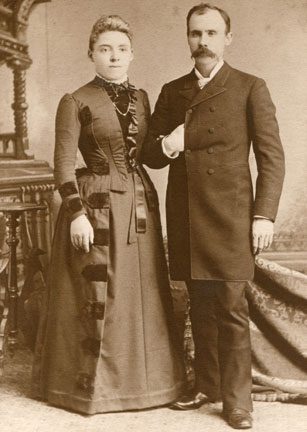
 I was supposed to have been a girl and was to be named after her but when I turn out to be a
boy they just added an "r" to the end of Olive. I particularly looked forward to her visits
because of the pies and cinnamon rolls she always made. Mother was terrific in many ways but
her baking talents never matched Grandma’s.
I was supposed to have been a girl and was to be named after her but when I turn out to be a
boy they just added an "r" to the end of Olive. I particularly looked forward to her visits
because of the pies and cinnamon rolls she always made. Mother was terrific in many ways but
her baking talents never matched Grandma’s.
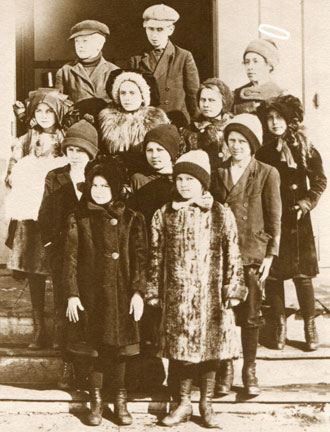
 Mother was born September 30, 1892. She completed Normal School in 1914 and was sent to teach
in a one room school in Cumberland, Iowa. The group photo on the left is her class in Cumberland.
I put a deserved halo over her head.
Mother was born September 30, 1892. She completed Normal School in 1914 and was sent to teach
in a one room school in Cumberland, Iowa. The group photo on the left is her class in Cumberland.
I put a deserved halo over her head.
 It was there she met Dad and they were married on March 13, 1915 at Creston, Iowa. In spite of
their marrying on the 13th their marriage lasted 65 years honoring their covenant, “Until death
do us part.”
It was there she met Dad and they were married on March 13, 1915 at Creston, Iowa. In spite of
their marrying on the 13th their marriage lasted 65 years honoring their covenant, “Until death
do us part.”
 After Mom and Dad left Cumberland they owned a restaurant and Dad told the story about the
first day he was there and the waitress was taking food left on dishes and putting it on
After Mom and Dad left Cumberland they owned a restaurant and Dad told the story about the
first day he was there and the waitress was taking food left on dishes and putting it on
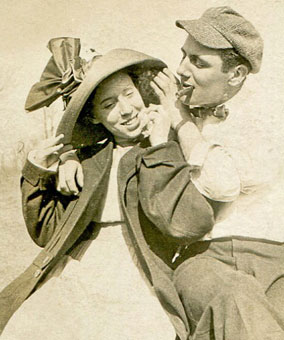 another plate. When asked what she was doing she told him she was fixing her lunch. It all
went in the garbage and that was the last time for that.
another plate. When asked what she was doing she told him she was fixing her lunch. It all
went in the garbage and that was the last time for that.
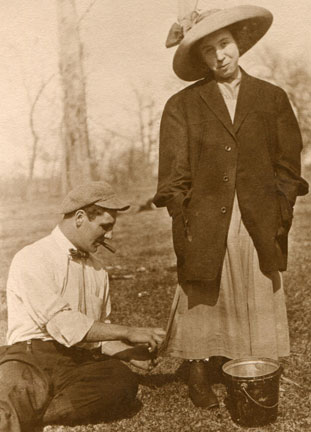
 I don’t know just when they moved to Minneapolis but Dad was working on a building as a painter
and fell off scaffolding. He never talked about it but he would do bending exercises every morning
the rest of his life to limber up. By the end of a work day it was noticeable because sometimes he
tended to be a little grumpy. However, he never let it hold him back when working evening and
weekends remodeling our home on 14th Street. He also kept us busy helping and learning.
I don’t know just when they moved to Minneapolis but Dad was working on a building as a painter
and fell off scaffolding. He never talked about it but he would do bending exercises every morning
the rest of his life to limber up. By the end of a work day it was noticeable because sometimes he
tended to be a little grumpy. However, he never let it hold him back when working evening and
weekends remodeling our home on 14th Street. He also kept us busy helping and learning.
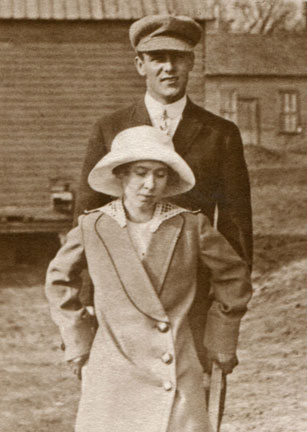
 In 1941, just before we entered WWII, they moved to a twenty acre home on the Colfax Road about
halfway between Grass Valley and Colfax, California. Brother Bob was 14 at the time and went
with them. The house was a two story that had been built when it was a large farm and was without
electricity or plumbing.
In 1941, just before we entered WWII, they moved to a twenty acre home on the Colfax Road about
halfway between Grass Valley and Colfax, California. Brother Bob was 14 at the time and went
with them. The house was a two story that had been built when it was a large farm and was without
electricity or plumbing.
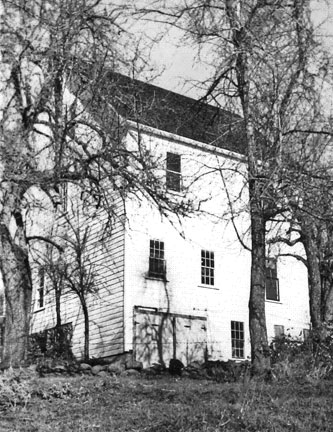
 So, they went to work, brought power in and had the house wired and plumbing installed. It was
built on a slope so one end had a large enclosed area with a spring that was used as a garage.
There was a hand pump in the kitchen that brought the water up to a sink but with electricity they
had a tank and a pump installed so they had running water to all fixtures. My first visit was to
build kitchen cabinets and on another I built them a double garage at the end of the entrance road
near the house. They installed a wood heater in the living room and put a grill in the ceiling to
let it heat the upstairs.
So, they went to work, brought power in and had the house wired and plumbing installed. It was
built on a slope so one end had a large enclosed area with a spring that was used as a garage.
There was a hand pump in the kitchen that brought the water up to a sink but with electricity they
had a tank and a pump installed so they had running water to all fixtures. My first visit was to
build kitchen cabinets and on another I built them a double garage at the end of the entrance road
near the house. They installed a wood heater in the living room and put a grill in the ceiling to
let it heat the upstairs.
 Dad loved it but I’m sure that Mother’s only satisfaction was that he was happy. He put in a truck
garden, bought and bred a cow and butchered the calf each year along with a pig. And of course
they had chickens and rabbits. There were some fallow pear trees and the cow loved the pears. An
enormous black walnut produced countless sacks of nuts each year.
Dad loved it but I’m sure that Mother’s only satisfaction was that he was happy. He put in a truck
garden, bought and bred a cow and butchered the calf each year along with a pig. And of course
they had chickens and rabbits. There were some fallow pear trees and the cow loved the pears. An
enormous black walnut produced countless sacks of nuts each year.
 When visiting we would always crack a few and pick out enough meat to flavor the ice cream made
with cream from the cow. Black walnuts are almost impossible to shell and you can only get the
meat out by using picks but it was worth it.
When visiting we would always crack a few and pick out enough meat to flavor the ice cream made
with cream from the cow. Black walnuts are almost impossible to shell and you can only get the
meat out by using picks but it was worth it.
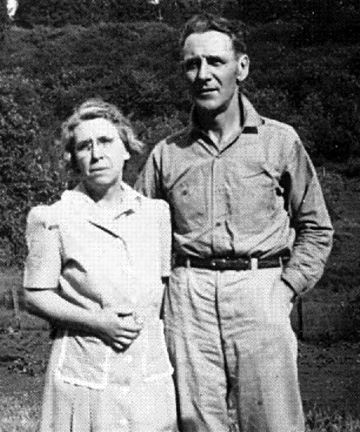
 The first Christmas we visited we walk up the side of the hill, found a tree we liked and
brought it to the house.
The first Christmas we visited we walk up the side of the hill, found a tree we liked and
brought it to the house.
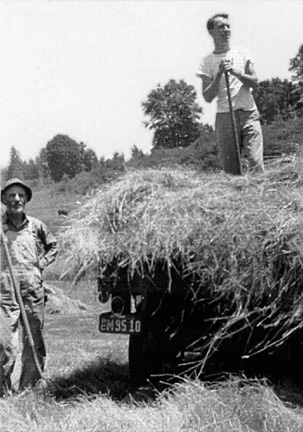
 Dad also worked for a contractor in Grass Valley and Bob would pick pears and later worked at
Penney’s. He attended a little school house about a mile down the road until they consolidated
the school district and then he was bussed to the new school. Later the little school was
converted to a home and when Bob retired years later they purchased it and were living there
when they passed away.
Dad also worked for a contractor in Grass Valley and Bob would pick pears and later worked at
Penney’s. He attended a little school house about a mile down the road until they consolidated
the school district and then he was bussed to the new school. Later the little school was
converted to a home and when Bob retired years later they purchased it and were living there
when they passed away.
 When Dad retired they moved to Sacramento and later moved to Leisure World, Seal Beach.
When Dad retired they moved to Sacramento and later moved to Leisure World, Seal Beach.
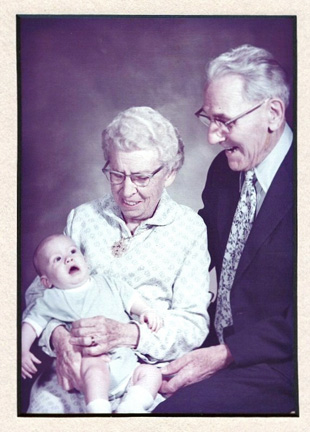
 Ater 62 years of marriage Dad passed away in 1977 at the age of 86 and Mom followed in 1982
at the age of 90. They are interned at the Westminster Memorial Park, Westminster, California.
Ater 62 years of marriage Dad passed away in 1977 at the age of 86 and Mom followed in 1982
at the age of 90. They are interned at the Westminster Memorial Park, Westminster, California.
 They were truly part of the "Greater Generation." Raising four sons and, after Howard died
his three girls, Pattie, Linda and Betty.
They were truly part of the "Greater Generation." Raising four sons and, after Howard died
his three girls, Pattie, Linda and Betty.

 Mom and Dad lost my sister Elizabeth, Roger and Teresa lost Megan and we lost Peggy. Fortunately
all of us had other children that helped fill the void they left.
Mom and Dad lost my sister Elizabeth, Roger and Teresa lost Megan and we lost Peggy. Fortunately
all of us had other children that helped fill the void they left.
 Elizabeth died when a lady who helped Mother took us out for a walk. Mother had told her not to
take us across Broadway to the park because of the street cars. She either didn’t understand or
disobeyed and when we came to Broadway Elizabeth was on the end of our hand holding chain. When
one car went by she released my hand and ran across Broadway and was struck by a street car
coming the other way. I was five and remember nothing of her or the accident. She is
interred in a Cemetery near Minneapolis.
Elizabeth died when a lady who helped Mother took us out for a walk. Mother had told her not to
take us across Broadway to the park because of the street cars. She either didn’t understand or
disobeyed and when we came to Broadway Elizabeth was on the end of our hand holding chain. When
one car went by she released my hand and ran across Broadway and was struck by a street car
coming the other way. I was five and remember nothing of her or the accident. She is
interred in a Cemetery near Minneapolis.
 I remember when Mom would get out a box of Elizabeth’s mementos and she would cry as she studied
each item and tell me about her. She had a book of poems with the one about "Little Boy Blue"
who had put his toys away and never returned. I discovered that Anne had learned it when she
was a girl and could still recite it.
I remember when Mom would get out a box of Elizabeth’s mementos and she would cry as she studied
each item and tell me about her. She had a book of poems with the one about "Little Boy Blue"
who had put his toys away and never returned. I discovered that Anne had learned it when she
was a girl and could still recite it.
|
Little Boy Blue by Eugene Field (1850-1895)
The little toy dog is covered with dust,
But sturdy and stanch he stands;
And the little toy soldier is red with rust,
And his musket moulds in his hands.
Time was when the little toy dog was new,
And the soldier was passing fair,
And that was the time when our Little Boy Blue
Kissed them and put them there.
"Now, don't you go till I come," he said,
"And don't you make any noise!"
So, toddling off to his trundle-bed,
dreamt of the pretty toys;
And, as he was dreaming, an angel song
Awakened our Little Boy Blue---
Oh! the years are many, the years are long,
But the little toy friends are true!
Ay, faithful to Little Boy Blue they stand
Each in the same old place---
Awaiting the touch of a little hand,
And they wonder as waiting the long years through
In the dust of that little chair,
What has become of our Little Boy Blue,
Since he kissed them and put them there.
|

 Megan was Teresa’s and Roger’s second child of five. She was 17 and was planning on becoming a chef
so she could afford to become and artist. She was on her way to work at 7:30 AM at a resort at Priest
River Lake and somehow lost control of the car and struck a tree. Teresa called me and told me between
sobs. I attended the beautiful memorial in the school gymnasium. It was very moving with her teachers,
classmates and friends expressing their regard for her.
Megan was Teresa’s and Roger’s second child of five. She was 17 and was planning on becoming a chef
so she could afford to become and artist. She was on her way to work at 7:30 AM at a resort at Priest
River Lake and somehow lost control of the car and struck a tree. Teresa called me and told me between
sobs. I attended the beautiful memorial in the school gymnasium. It was very moving with her teachers,
classmates and friends expressing their regard for her.
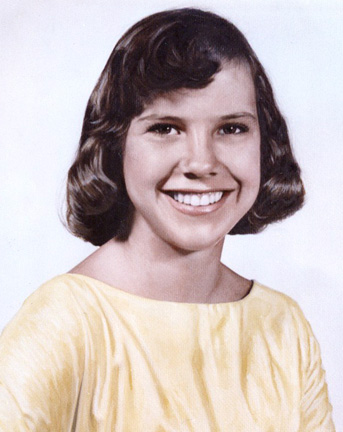
 When Peggy died she was recovering from heart surgery that corrected a congenital heart condition.
The surgery went well and on her third day at home I left the office to see how she was and found
she wasn’t feeling well. After discussing it with Marguerite I left and she was preparing to take
Peggy to the doctors when she died in Marguerite’s arms. The fluid in the heart sack had become
infected, expanded and caused a blood clot that went to her lungs. A neighbor called at me at the
office and told to go to St. Mary’s Hospital where I found Marguerite in the Chapel. It was a
difficult time but our neighbors and friends were extremely helpful. Peggy and Marguerite are
interred at All Souls Cemetery in Long Beach.
When Peggy died she was recovering from heart surgery that corrected a congenital heart condition.
The surgery went well and on her third day at home I left the office to see how she was and found
she wasn’t feeling well. After discussing it with Marguerite I left and she was preparing to take
Peggy to the doctors when she died in Marguerite’s arms. The fluid in the heart sack had become
infected, expanded and caused a blood clot that went to her lungs. A neighbor called at me at the
office and told to go to St. Mary’s Hospital where I found Marguerite in the Chapel. It was a
difficult time but our neighbors and friends were extremely helpful. Peggy and Marguerite are
interred at All Souls Cemetery in Long Beach.
|
|
Early Memories
|
 Wearing BVDs in the summer, (One piece under wear without sleeves or legs.) and changing to long
underwear in the winters. Remember, this was Minneapolis’s heat and humidity in the summer and
snow and freezing in the winter. Most of the time, weather permitting, we wore bib overalls and
went barefoot.
Wearing BVDs in the summer, (One piece under wear without sleeves or legs.) and changing to long
underwear in the winters. Remember, this was Minneapolis’s heat and humidity in the summer and
snow and freezing in the winter. Most of the time, weather permitting, we wore bib overalls and
went barefoot.
 We had an alley that was covered with cinders and not easy to walk on in your bare feet. A junk man
with a horse drawn wagon would come by occasionally sorting out trash.
We had an alley that was covered with cinders and not easy to walk on in your bare feet. A junk man
with a horse drawn wagon would come by occasionally sorting out trash.
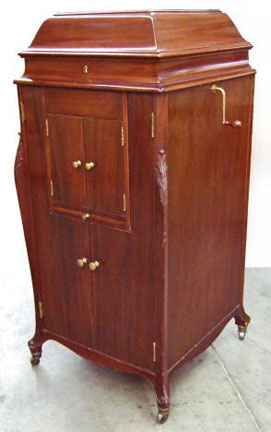
 Dad dug a basement and had a coal burning, hot air, gravity furnace installed. A cousin from Iowa
came to help and bought us a record that we played over and over on our stand up Victrola. Part of
the lyrics were, “Give me a night in June beneath the moon with you just you.”
Dad dug a basement and had a coal burning, hot air, gravity furnace installed. A cousin from Iowa
came to help and bought us a record that we played over and over on our stand up Victrola. Part of
the lyrics were, “Give me a night in June beneath the moon with you just you.”
 Walking to school one winter wearing a pair of mittens that had a hole in one finger I hid them in
a snow bank. Of course I couldn’t find them after school. Mom and I had a conversation later which
needless to say she dominated.
Walking to school one winter wearing a pair of mittens that had a hole in one finger I hid them in
a snow bank. Of course I couldn’t find them after school. Mom and I had a conversation later which
needless to say she dominated.
 Dad would give our teacher out of date wall paper sample books and we would cut out flowers and
figures and create works of art. We also put on the Nativity scene at Christmas which is forbidden
in public schools today. I played one of the wise men and as I look back on some of my life
decisions I question that I deserved the title.
Dad would give our teacher out of date wall paper sample books and we would cut out flowers and
figures and create works of art. We also put on the Nativity scene at Christmas which is forbidden
in public schools today. I played one of the wise men and as I look back on some of my life
decisions I question that I deserved the title.
 It was also just a short walk from home across Broadway to a larger park where in the winter they
would flood the playground, build big bonfires and Dad would take us there to skate. In the summer
time we could stay outside and play until dark with all the kids in the neighborhood participating.
A small park across the street had a little slope that we would roll down in order to get dizzy.
It was also just a short walk from home across Broadway to a larger park where in the winter they
would flood the playground, build big bonfires and Dad would take us there to skate. In the summer
time we could stay outside and play until dark with all the kids in the neighborhood participating.
A small park across the street had a little slope that we would roll down in order to get dizzy.
 One winter Dad had shoveled a path to the garage and I remember it was over my head. Another time in
the summer there was a storm that blew a huge tree across the street in front of our house that
blocked it for days before it was removed.
One winter Dad had shoveled a path to the garage and I remember it was over my head. Another time in
the summer there was a storm that blew a huge tree across the street in front of our house that
blocked it for days before it was removed.
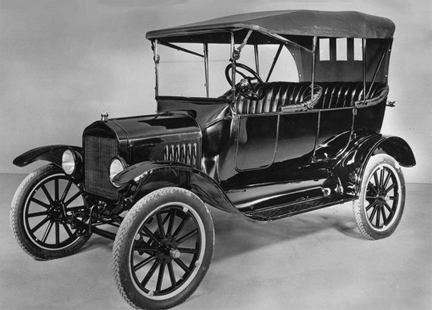
 We had a Model T and Dad taught me to get your arm out of the way after you gave the crank a whirl to
avoid a broken arm when the engine caught. He told us he had driven it to Pike’s Peak in Colorado and
had to back up the mountain because the gas was fed by gravity and it couldn’t flow to the carburetor
going up a steep hill, but backing up worked okay.
We had a Model T and Dad taught me to get your arm out of the way after you gave the crank a whirl to
avoid a broken arm when the engine caught. He told us he had driven it to Pike’s Peak in Colorado and
had to back up the mountain because the gas was fed by gravity and it couldn’t flow to the carburetor
going up a steep hill, but backing up worked okay.
 Other bits of memory are a house across the street catching fire and a class mate of Howard’s dying of
Polio. I loved to draw and a pencil and paper usually kept me busy. I remember copying a dollar bill
that was admired and told that it was illegal to reproduce them. I doubt that it would have passed
scrutiny even in a foreign country.
Other bits of memory are a house across the street catching fire and a class mate of Howard’s dying of
Polio. I loved to draw and a pencil and paper usually kept me busy. I remember copying a dollar bill
that was admired and told that it was illegal to reproduce them. I doubt that it would have passed
scrutiny even in a foreign country.
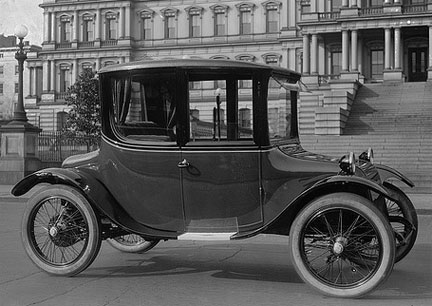
 The electric car on the right belonged to the lady across the street. It looked as peculiar to
me then as it does now. In searching for the photo I discovered that electric cars were made
mostly for ladies because they didn’t require the repairs of combustion engines.
The electric car on the right belonged to the lady across the street. It looked as peculiar to
me then as it does now. In searching for the photo I discovered that electric cars were made
mostly for ladies because they didn’t require the repairs of combustion engines.
 I must have been five or six when Dad drove us to Iowa to visit Alice, a gracious lady raised
by Dad’s brother Jess as part of his family. They had a small farm just south of the Minnesota
border where they raised everything they needed plus produce they sold. Howard and I stayed a
week sleeping in feather beds and following her husband around as he did his work and chores.
They had milk cows, pigs, chickens and a plow horse that we rode. We collected the eggs and then
candle them. Almost 50 years later I was conducting a sales management seminar in Minneapolis
and flew Mother to visit Alice and then joined them later. Uncle Jess and his son Bernard were
there also. Alice was still using a Singer Sewing machine that her husband had given her as a
wedding present more than 50 years before. It was a treat for Mother and a long trip into the
past for us both.
I must have been five or six when Dad drove us to Iowa to visit Alice, a gracious lady raised
by Dad’s brother Jess as part of his family. They had a small farm just south of the Minnesota
border where they raised everything they needed plus produce they sold. Howard and I stayed a
week sleeping in feather beds and following her husband around as he did his work and chores.
They had milk cows, pigs, chickens and a plow horse that we rode. We collected the eggs and then
candle them. Almost 50 years later I was conducting a sales management seminar in Minneapolis
and flew Mother to visit Alice and then joined them later. Uncle Jess and his son Bernard were
there also. Alice was still using a Singer Sewing machine that her husband had given her as a
wedding present more than 50 years before. It was a treat for Mother and a long trip into the
past for us both.
 We had also visited Uncle Jess who had a farm goods store, harness, etc. and was also the town
bootlegger, a recognized public service. He had several hounds he used for hunting and we loaded
them into a truck and took them to the river where we had a great time because they loved the
water too. We also attended a motion picture in an empty room over a store. I don’t remember
what it was about. But speaking of movies, I do remember Dad taking us see "The Gold Rush",
released in twenties. It was written, directed, and stared Charlie Chaplin. I remember his
trying to eat the sole of his shoe and the scene where a rope tied to a stake in the ground
saved his cabin from blowing away in a storm.
We had also visited Uncle Jess who had a farm goods store, harness, etc. and was also the town
bootlegger, a recognized public service. He had several hounds he used for hunting and we loaded
them into a truck and took them to the river where we had a great time because they loved the
water too. We also attended a motion picture in an empty room over a store. I don’t remember
what it was about. But speaking of movies, I do remember Dad taking us see "The Gold Rush",
released in twenties. It was written, directed, and stared Charlie Chaplin. I remember his
trying to eat the sole of his shoe and the scene where a rope tied to a stake in the ground
saved his cabin from blowing away in a storm.
|

